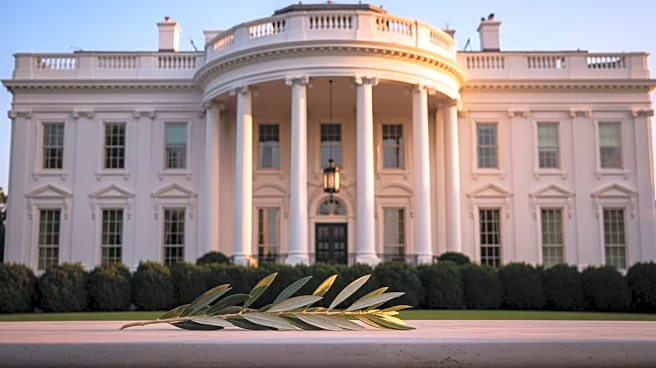What's Happening?
President Donald Trump is hosting Syrian President Ahmad al-Sharaa at the White House, marking the first visit by a Syrian head of state since Syria's independence from France in 1946. This visit follows
the lifting of U.S. sanctions on Syria, a move supported by the United Nations Security Council. Al-Sharaa, who led the forces that toppled former Syrian President Bashar Assad, has been recognized as Syria's interim leader since January. The meeting is part of President Trump's diplomatic efforts to integrate Syria into a U.S.-led global coalition against the Islamic State group. The visit is seen as a significant step in U.S.-Syria relations, with Trump expressing optimism about Syria's progress under al-Sharaa's leadership.
Why It's Important?
The meeting between President Trump and President al-Sharaa represents a pivotal shift in U.S. foreign policy towards Syria, potentially impacting international relations and security dynamics in the Middle East. By welcoming Syria into the coalition against the Islamic State, the U.S. aims to strengthen its strategic alliances and enhance regional stability. The lifting of sanctions could open avenues for economic recovery and international investment in Syria, although concerns remain about human rights abuses under Assad's regime. The diplomatic engagement underscores the U.S.'s commitment to fostering peace and stability in conflict-ridden regions, with potential benefits for global security and counterterrorism efforts.
What's Next?
The future of U.S.-Syria relations hinges on the permanent repeal of sanctions, which currently require congressional action. Proposals from U.S. lawmakers, including Sen. Jeanne Shaheen and Sen. Lindsey Graham, offer differing approaches to sanctions repeal, with potential implications for international business investments in Syria. The outcome of these legislative efforts will shape Syria's economic prospects and its role in the global coalition against terrorism. Continued diplomatic engagement and collaboration with U.S. forces could further integrate Syria into international security frameworks, influencing regional power dynamics and peace initiatives.
Beyond the Headlines
The lifting of sanctions and diplomatic engagement with Syria may have broader implications for U.S. foreign policy, particularly in terms of ethical considerations surrounding human rights. The decision to engage with a regime previously accused of human rights violations raises questions about the balance between strategic interests and moral responsibilities. Additionally, the integration of Syria into global coalitions could shift long-term geopolitical alliances, affecting U.S. relations with other Middle Eastern countries and influencing global counterterrorism strategies.










